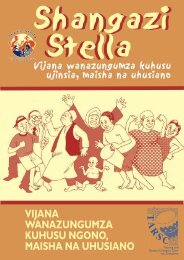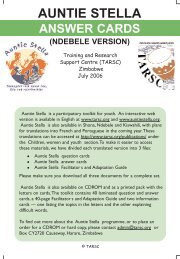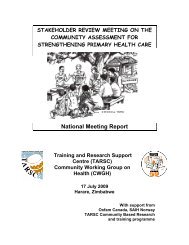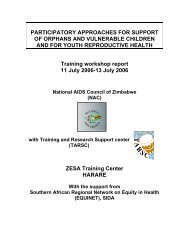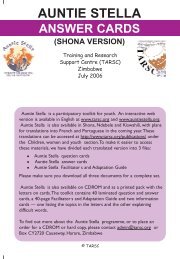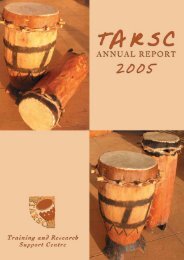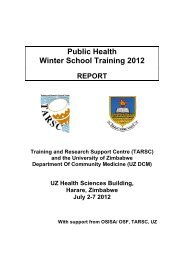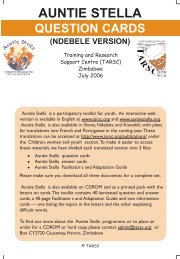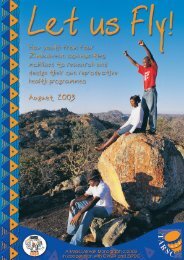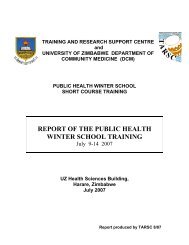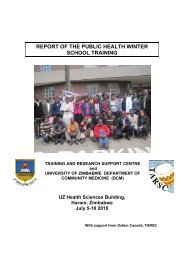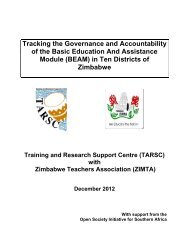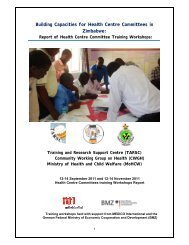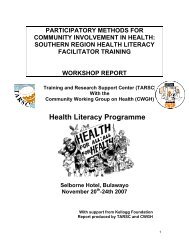HLregional meeting09.pdf - Training and Research Support Centre
HLregional meeting09.pdf - Training and Research Support Centre
HLregional meeting09.pdf - Training and Research Support Centre
You also want an ePaper? Increase the reach of your titles
YUMPU automatically turns print PDFs into web optimized ePapers that Google loves.
“Through health literacy we have been able to make local government account <strong>and</strong> old people have<br />
gone to clinics <strong>and</strong> dem<strong>and</strong>ed free services because that is what the policy say. In Zimbabwe there<br />
is a policy that says children under five, pregnant women <strong>and</strong> the elderly above the age of 65 should<br />
not pay for health services, this policy is sparsely implemented <strong>and</strong> where it is implemented is where<br />
people have the knowledge about it, this is where we have seen that through health literacy a critical<br />
knowledgeable mass can make governments accountable <strong>and</strong> in turn this promotes primary health<br />
care…” Itai Rusike CWGH- Zimbabwe<br />
‘I am getting to have a clear underst<strong>and</strong>ing of Health Literacy <strong>and</strong> I see it working well in Tanzania,<br />
however I feel that perhaps the approach would be slightly different taking into cognizant the context<br />
of Tanzania <strong>and</strong> how we work as AMREF Tanzania. I see a situation whereby we invest in the<br />
ministry of health <strong>and</strong> Health Literacy facilitators could be invested in already existing government<br />
volunteer cadreship so that skill <strong>and</strong> capacity investment is measurable, sustainable though a pool of<br />
resources coming from different ends <strong>and</strong> angles to strengthen our primary health care efforts.<br />
Working within can also give pressure for governments <strong>and</strong> ministries alike to take community<br />
participation <strong>and</strong> inputs seriously from the onset…” Martin Mkuye AMREF-Tanzania<br />
We agreed that Health Literacy ensures that the community is an equal <strong>and</strong> active partner with the<br />
other stakeholders <strong>and</strong> links knowledge to action in a continuous two-way learning process. As such,<br />
it is an impetus for change. We will form a Health Literacy Social Movement in Africa <strong>and</strong> beyond<br />
that addresses Primary Health care <strong>and</strong> strengthens Health systems through bottom up approaches.<br />
4. Country experiences<br />
This session was aimed at reviewing country experiences, progress, performance, challenges <strong>and</strong><br />
opportunities in implementing Health literacy work. It also identified strengths <strong>and</strong> best practices<br />
taken forward in key areas of social empowerment <strong>and</strong> action on health through health literacy.<br />
Implementing country partners explored the key features of the programme <strong>and</strong> their link to the<br />
changes effected at community level; in facilitator skills; in organizational capacities <strong>and</strong> skills; <strong>and</strong><br />
health systems <strong>and</strong> health while this was a learning platform for new country partners in the region.<br />
4.1. Zimbabwe<br />
Mr. Itai Rusike the Director of the Community Working group on Health briefly gave the background<br />
of the CWGH <strong>and</strong> the Health Literacy programme in Zimbabwe. He highlighted that after the training<br />
of Health Literacy facilitators in 2007, implementation began to unfold at community level in 21<br />
districts across nine of the ten provinces of Zimbabwe. Facilitators were trained in two batches one<br />
covering the northern region of Zimbabwe <strong>and</strong> another covering the southern districts of Zimbabwe.<br />
2008 saw the spiraling of the Health Literacy programme, into a vibrant, relevant <strong>and</strong> self sustaining<br />
process, at community level, at organizational <strong>and</strong> at national level.<br />
Mr Rusike added that the Health Literacy programme in Zimbabwe successfully provided mentorship<br />
<strong>and</strong> support to district Health Literacy facilitators during community meetings <strong>and</strong> other local health<br />
activities in the 21 CWGH chapters. Health literacy has successfully empowered <strong>and</strong> strengthened<br />
the voices of vulnerable social groups in Zimbabwe. The national health literacy review meetings<br />
Consolidated experiences <strong>and</strong> enabled Health Literacy facilitators to exchange <strong>and</strong> share<br />
experiences <strong>and</strong> best practices in the implementation of the health literacy programme at community<br />
level. He aknowdged the technical support <strong>and</strong> mentoring from TARSC throughout the period <strong>and</strong> in<br />
15



